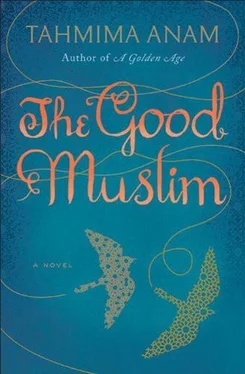Sohail was smoking a cigarette in the garden. He flicked it aside when he saw her.
‘Someone is looking for you.’
‘Who?’
‘I don’t know. Some girl. She won’t tell me anything.’
He rushed to the gate. ‘Piya?’
The woman appeared to straighten at the sight of him, and a moment later they were hugging and she was wiping her face with the end of her sari. ‘They threw me out,’ she cried. ‘I have no place with them.’
‘You did the right thing,’ he said.
Maya stood there awkwardly, her hand on the latch, guilty for the stab of jealousy she felt at the sight of their embrace. Then the woman shifted, and the covering fell from her head. Maya inhaled sharply. Her hair was short, obviously shorn just a few weeks ago. Sohail led Piya inside, casting only the briefest glance at Maya, a look that seemed to say, please don’t ask me; for once, please don’t ask.
When Maya returned from the Rehabilitation Centre in the evening, Piya was sitting in the living room. Rehana was patting her on the back. ‘Piya is going to stay with us.’
Piya nodded at Maya, who nodded back. No one said anything about why she was there. They guessed that Sohail had met this woman during the war, that she was in trouble and that her family had sent her away — and there was only one kind of trouble, Maya knew, that would have led to her appearance on their doorstep.
Maya saw women like Piya every day at the Rehabilitation Centre; they had been pouring into the city for weeks. Some had been raped in their villages, in front of their husbands and fathers, others kidnapped and held in the army barracks for the duration of the war. Maya was tasked with telling these women that their lives would soon return to normal, that they would go home and their families would embrace them as heroes of the war. She said this to their faces every day knowing it was a lie, and they listened silently, staring into their laps and willing it to be true.
Some recognised the lie for what it was. The new government had allowed a few of the enemy soldiers to return home to Pakistan, as a gesture of generosity in the face of victory, and a number of the women decided to go with them. Maya was woken one morning by a phone call from the Centre. They’re at the airport, they’re trying to leave.
The airport was a mess, people trying to get in or out of the new country, pushing themselves to the head of any queue that formed as soon as a desk was manned. But dressed as brides, the women were unmistakable, nose pins strobing in the sunlight, bangles weighing down their wrists, making each motion heavy and musical. Some wore flowers in their hair, and one or two had even gone to the trouble of painting henna on their hands.
Nearby, the soldiers were being unshackled, one by one. They clustered around each other and whispered casually among themselves. Occasionally, one of them smiled.
A volunteer from the centre, dressed plainly and with her hair loose, appealed to the departing women.
‘It’s not right,’ she said; ‘you haven’t even told your families.’
One stepped forward. ‘They said they don’t want us. Where are we supposed to go? What do we eat?’
‘The Women’s Rehabilitation Board will make provisions for you.’
‘What provisions? Will you give us our families? Will you take us into your homes?’
‘We will rehabilitate you. Back into society. Didn’t you hear what Sheikh Mujib said? He said you were heroines, war heroines.’
Another woman spoke up. ‘We don’t want to be heroines. We are ashamed. We want to leave our shame behind, start again.’
Maya joined in. ‘Please don’t abandon us now.’
The soldiers filed on to the aeroplane. How tall they were, how straight they stood.
The brides picked up their tiffin carriers, their small cloth bags. They lifted their saris so they could make their way up the stairs and into the aeroplane. And then it swallowed them; the hatch was closed, the engine roused, leaving the volunteers on the black and blue tarmac.
It was time, they were told, to forgive. Forgive and forget. Absolve and misremember. Erase and move on. The country had to become a country. Just as it had needed them, once, to send their brothers into the fighting, to melt their pots and surrender their jewellery, so it now needed them to forget.
It was the least they could do.
The prisoners of war were released, put back into their uniforms and sent home to Pakistan. No sorrys were exchanged. Anointed by the hand of forgiveness, they would grow old without shame.
Maya knew exactly what had happened to Piya. No explanation was necessary.
Piya slept all day, oblivious as they worked around her, ate their meals, tied and untied the mosquito nets, swept the floor by her feet. Maya sometimes woke in the middle of the night and found her gone, but she was only in the garden, or out on the verandah, squatting and staring into the distance. She did not attempt to take Maya into her confidence, and Maya did not try to appeal to her. If she needed something, she addressed herself to Rehana — Maya saw them whispering to each other in the kitchen a few times. Piya began to help Ammoo in the kitchen, grinding spices with the rough-edged stone, rolling the rootis for breakfast. Other than that, she was a half-presence, a person both with and without them. Maya sometimes forgot she was there — she was busy too, feeling her way around the strangeness of peace, of having her brother at home again, of being encouraged, now that it was all over, to make a display of enjoying the country.
Two weeks after Piya arrived, Maya saw her in the garden with Sohail. It was early evening, the shutter of darkness about to close. She watched them from the verandah. If they had looked up they would have seen her, but both pairs of eyes were lowered, staring at the same thing in front of them. Piya rubbed her hands across her arms, and Sohail offered her his shawl, wrapping it loosely around her shoulders. Their hair was of a similar length, and from a distance they seemed like brothers, two men sharing men’s secrets. The light began to fade; Piya looked up and saw Maya staring and nudged Sohail. They waved.
She walked over gingerly, knowing she had interrupted something.
‘Come,’ Sohail said, ‘sit.’
She squatted down on the jute mat next to them. They edged over to make space for her but the pati was too small, and Piya ended up on the grass. ‘Let me get another one,’ Sohail said, quick to his feet.
They were alone. Piya plucked at the grass while Maya looked uncomfortably up and down the garden, wondering if they should talk about Sohail, or the war, or why Piya was here. Finally Piya said, ‘You’re very good, letting me stay.’ She pulled out a blade of grass, twisted it between her hands.
‘Where were you,’ Maya asked, ‘before?’
Piya concentrated on the long blade of grass, tying knots across its length. ‘In an army camp,’ she said. ‘He found me there, in the barracks.’
‘Where is your family?’
‘Not far. In Trishal. You think I should go home?’
She hadn’t meant it that way. ‘No, of course, you can stay here.’ She wanted to tell Piya how glad she was that she had come, that she had brought a flash of life back to her brother. She made an awkward attempt at friendliness. ‘Stay as long as you like.’
Sohail returned with the pati; they stood up, rearranged themselves.
Piya didn’t sit down. ‘I’m just coming,’ she said, and darted into the kitchen.
‘She’s better,’ Sohail said. ‘Doesn’t she look better, already?’
‘Yes, she does.’ Maya wanted to ask him if he was better, but there seemed no reason to ask him this. For once he looked relaxed, his white cotton kurta gleaming in the fading light. He appeared in perfect health, in perfect cheer, rather than like a man who had yet to shake off the war, a man who had brought home a strange woman. An ordinary man. She decided to treat him as one.
Читать дальше












